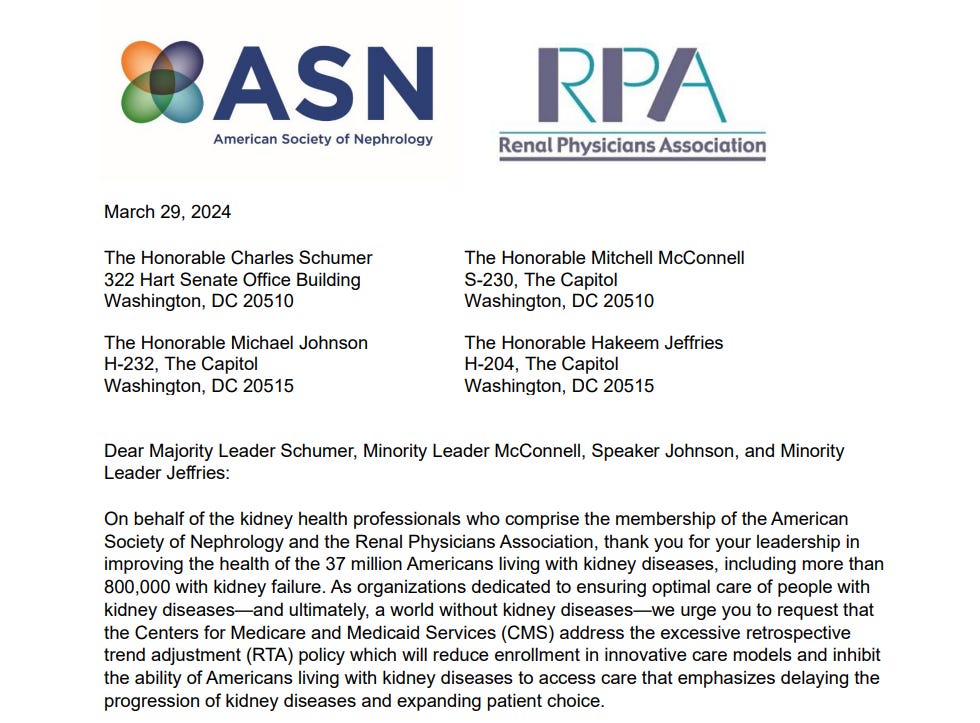This year’s RPA Meeting is a Golden Anniversary, marking 50 years for the Renal Physicians Association.
As I mentioned in our inaugural 2024 Conference Calendar, this year’s meeting has an exciting lineup of education and networking opportunities, especially in light of recent hot button topics in the kidney space like value-based care, health equity, artificial intelligence and transplantation.
Whether or not you’ll be in attendance, I thought it might be helpful to preview a few of themes and questions we expect to dig into in Baltimore over the next few days.
ICYMI — we just launched a weekly discussion forum that will take place right here on Signals every Friday. Say hello and stay tuned!
Themes & Sessions
Here's what caught my eye on the agenda and who I'm looking forward to seeing and learning from in the Kidneyverse this week/end:
On leadership. General Gustave Perna will be sharing leadership lessons based on his experiences heading up Operation Warp Speed during the pandemic. In a healthcare landscape that is changing rapidly with both clinical & policy innovations, and with nephrology professionals at the center of much of this change, I'm sure this one will resonate with leaders at every level in the room.
On value-based care. VB kidney care takes the main stage with updates from CMMI and RPA leadership, as well as a panel that will share best practices of successful primary care organizations about what has worked for them and what translates into nephrology-specific models. Speakers include: Liz Fowler, Robert Blaser, Renuka Sothinathan, Robert Fuld, and Jeff Perlmutter. There will also be an update on CMMI Health Policy in a Saturday panel with Tom Duvall, Miriam Godwin, and Leslie Wong, MD, MBA, FACP, FASN.
On VBC data. Of course, what's VBC without data? Being able to use data effectively is vitally important to being successful in the VBC model. This includes clinical, operational and financial data. Sessions will focus on each of these data areas with speakers including: Adam Weinstein, Jay Agarwal MD, MBA, Katy Rotroff, and Alex Portet.
On “green nephrology.” I'm glad to see an entire session focused on "green nephrology", which focuses on the impacts of climate change on human health and how kidney disease has become a bellwether for climate-related health impacts. Speakers include: Natalie Freidin, Cheryl Holder, and Graham Abra, MD.
On education & training! What I'm (selfishly) most excited about are the workshops around education, patient safety, and home retention. Looking forward to all things early career education, APP training, and home starts. Speakers include Charlotte Dixon, Raj Davda, Matthew Smith, Deidra Crews, MD, ScM, FASN, MACP, Lacey Ann Carlson, Sumeska Thavarajah, and Harry Giles.
On AI. You know artificial intelligence will be tuning in, and in more ways than one. It’s the other elephant in the room — there are 3 or 4 in kidney care... it's a big room. Excited to hear from Navdeep Tangri, Sayed Tabatabai, and Sean McGunigal on all things clinical decision support, embedded EMR applications, and how these technologies affect the practice of nephrology (or not).
On transplantation. Finally (for me at least) there's transplantation. Following a landmark milestone in xenotransplant last month, we'll get to hear about VBC's role in transplant, managing transitions of care, and what's next in the field. Looking forward to lessons from Mona Doshi, Dr. Neeraj Singh, and Alison Grazioli.
Retro Trend Adjustments
This one is on the docket and it seems like all the right people will be “in the room” who might have a say in how this transpires over the next few weeks. I want to better understand potential impacts of the proposed retro trend adjustment (RTA) ahead of the RPA meeting, and I’d love your help.
A recent Healio piece sheds some light on this for us. “While nephrologists were comfortably aware of the use of the retroactive trend adjustment when entering into CKCC contracts, surprise arose over the magnitude of the reductions,” Keith A. Bellovich, DO, RPA president, told Healio.
“These assumptions, using data from years when COVID skewed kidney care utilization, were completely unexpected and 2-3x larger than anticipated.”
How it works
In the CMS contracting model, nephrology practices agree to take on a higher financial risk when providing patient care, with the hope that shared savings with Medicare after producing better patient outcomes will recoup that investment.
Here's an example (for illustrative purposes):
CMS gives a Nephrology Group their proposed benchmark of $10 million in 2022, which means CMS projects the nephrologists will spend $10 million providing care to their kidney patients.
In 2022 the Nephrology Group invests in more staff and services to provide better care to their kidney patients. They improve outcomes for those patients and save money. In the end, the Nephrology Group only spends $9 million on better care for their patients in 2022.
In November 2023, CMS told the Nephrology Group they predicted their 2022 spend incorrectly and they will be applying the retrospective trend adjustment which makes the new benchmark $8 million for 2022. This means that 11 months after the performance year ended the Nephrology Group goes from
saving$1 million to increasing costs for patients by $1 million. This impacts their bottom line since they only capture savings after CMS gets its guaranteed taxpayer savings.
Here’s the full text of ASN-RPA’s letter to the powers that be, urging action and collaboration ahead of the April 30, 2024 deadline.
Discussion
I’d like to “open the floor” up to hear what’s on your mind. Feel free to leave a comment below or share your thoughts in our new chat forum.
![Signals From [Space]](https://substackcdn.com/image/fetch/w_80,h_80,c_fill,f_auto,q_auto:good,fl_progressive:steep,g_auto/https%3A%2F%2Fsubstack-post-media.s3.amazonaws.com%2Fpublic%2Fimages%2F55686857-6b99-45a6-ac0f-09c9f023f2a0_500x500.png)
![Signals From [Space]](https://substackcdn.com/image/fetch/e_trim:10:white/e_trim:10:transparent/h_72,c_limit,f_auto,q_auto:good,fl_progressive:steep/https%3A%2F%2Fsubstack-post-media.s3.amazonaws.com%2Fpublic%2Fimages%2F4d588ac1-7fac-4bd4-829d-fc7b4e8f1326_1512x288.png)

![Signals From [Space]](https://substackcdn.com/image/fetch/w_36,h_36,c_fill,f_auto,q_auto:good,fl_progressive:steep,g_auto/https%3A%2F%2Fsubstack-post-media.s3.amazonaws.com%2Fpublic%2Fimages%2F55686857-6b99-45a6-ac0f-09c9f023f2a0_500x500.png)



